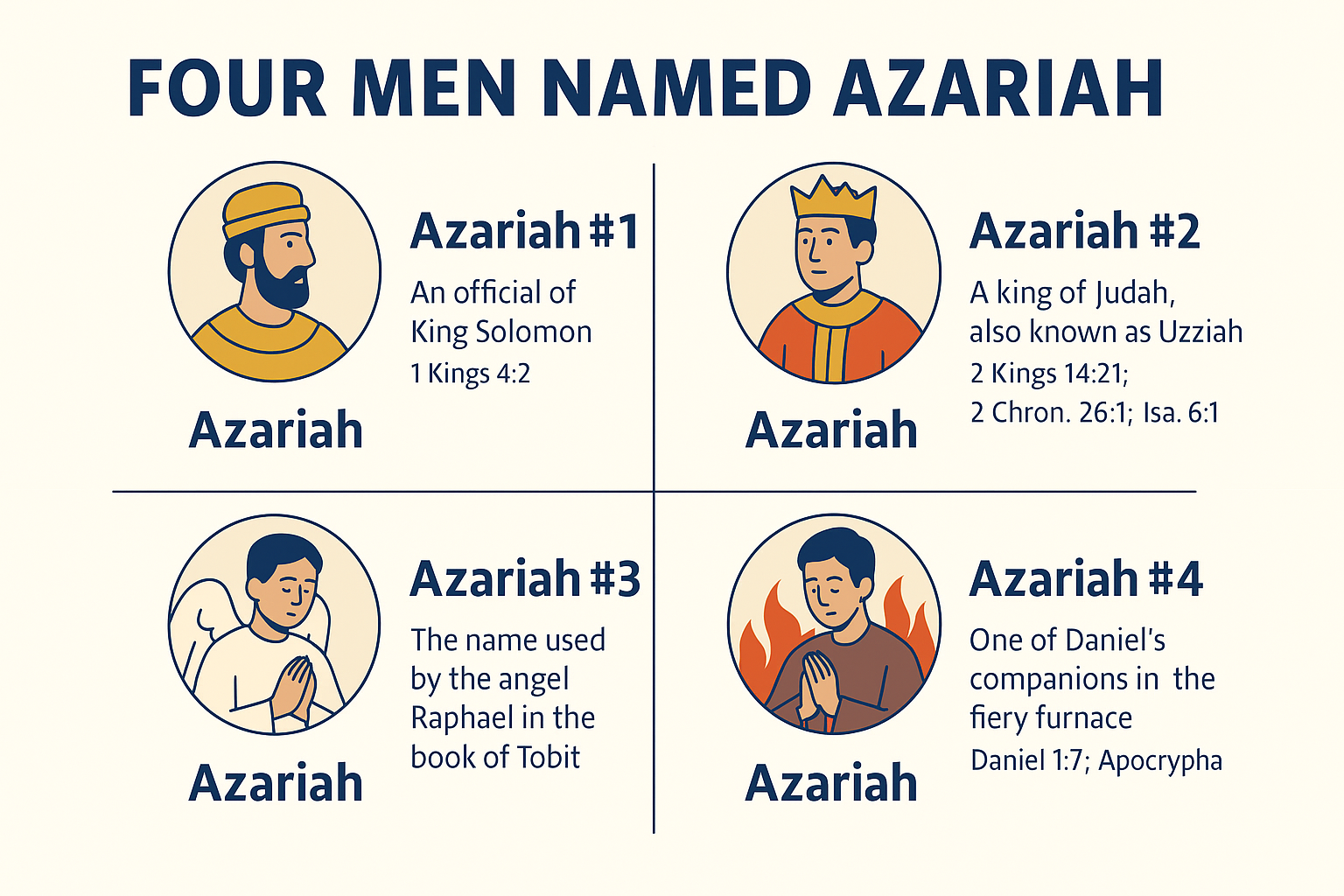Who Was Azariah in the Bible?
Share

Azariah was a very common Jewish name in the ancient world, and the Bible speaks of multiple men named Azariah. This article will delve into the life and works of the four more notable men or figures named Azariah.
The Anchor Yale Bible Dictionary tells us, “Azariah is a personal name (meaning “Yahweh has helped”) given to a number of individuals in the books of the Hebrew Bible (the Old Testament) and the LXX (the Septuagint, which is the Greek translation of the Old Testament). Identification of some of the individuals remains tentative because of differences between parallel genealogical texts, differences between the MT [Masoretic Text] and the versions, and questions about the intended function of the genealogical material in the various books.”
Within the canon of Scripture, the name Azariah is mentioned only in the Old Testament. His name is found in 1 and 2 Kings, 1 and 2 Chronicles, Ezra, Nehemiah, Jeremiah, and Daniel.
The name Azariah is also known in the Apocrypha (Jewish books included in the Old Testament canon of Roman Catholicism and Eastern Orthodoxy). Azariah is mentioned in those texts in 1 Maccabees and 1 Esdras. Although most Protestant scholars do not consider the books of the Apocrypha as scriptural canon, they are used for historical reference.

Is There More Than One Azariah in the Bible?
Scholars identify no less than twenty-six different men named Azariah in Scripture. All of them are included for God’s purposes in the narrative of His redemptive history within humanity, leading to Jesus Christ the Messiah. Therefore, when we consider each person (yes, each one) named in the Bible, it benefits us to ask the Lord to reveal how they factor into the overall theme of the Bible—the Lord Jesus Christ.
Azariah #1:
The first mention of a man named Azariah is in 1 Kings 4:2 as one of King Solomon’s officials: “These were his officials: Azariah the son of Zadok the priest.”
Azariah #2:
When we read 2 Kings 14:21, we learn about an important king in Judah’s history: “And all the people of Judah took Azariah, who was sixteen years old, and made him king in the place of his father Amaziah.” Further references to his ascension and reign may be found in 2 Kings 14:19-22, 15:1-2, 1 Chronicles 3;11, 2 Chronicles 26:1, 2 Kings 15:13, 30, 32, 34, 2 Chronicles 26:1-23, and 27:2.
When reading his account, we discover this young king Azariah reigned fifty-two years in Judah (in the time of the divided kingdom) and is also known as Uzziah. ESV biblical scholars unpack the reasoning behind his dual names, stating that Azariah was the king’s personal name, and Uzziah was the name he adopted for use as king.
Isaiah the prophet was active during Azariah’s reign over Judah, and many of us recall Isaiah’s stunning report of his vision from the Lord God, “In the year that King Uzziah died I saw the Lord sitting upon a throne, high and lifted up; and the train of his robe filled the temple” (Isaiah 6:1).
As a man, “He set himself to seek God in the days of Zechariah, who instructed him in the fear of God, and as long as he sought the LORD, God made him prosper” (2 Chronicles 26:5). Azariah served as a relatively good king over the southern kingdom of Judah (2 Kings 15:2-3; 2 Chronicles 26:3-4). We say “relatively” because Azariah, even though he had military and “nation-building” achievements (2 Kings 14:7-10; 2 Chronicles 26: 1-15), did not remove the high places, “Only the high places were not taken away; the people still sacrificed and burned incense on the high places” (2 Kings 15:5). The high places were places where other gods were worshiped, and the mingling of idol worship with worship of the Lord God was evil in His sight, for He is holy and will share His glory with no one (Leviticus 20:26; Isaiah 48:11).
2 Chronicles 26:16-23 gives us a report of Azariah’s pride and its consequences. “But when he was strong, he grew proud, to his destruction. For he was unfaithful to the LORD his God and entered the temple of the LORD to burn incense on the altar of incense” (v 16). Ironically, a priest named Azariah (along with eighty other priests who were “men of valor”) confronted the king. It was not for the king to burn incense before the Lord. It was the priest’s duty and privilege (cf. 1 Samuel 13:8-14).
“Then Uzziah was angry. Now he had a censer in his hand to burn incense, and when he became angry with the priests, leprosy broke out on his forehead in the presence of the priests in the house of the LORD, by the altar of incense.” Uzziah (Azariah) was a leper to the day of his death and was separated from his family and all other people.
No matter his sin, this Azariah, we find out, is in the lineage of Christ, and that’s what makes him a notable man. As a member of the tribe of Judah, Azariah reigned over the Kingdom of Judah. And Christ, as we know, is the “Lion of the tribe of Judah” (Revelation 5:5).
Is Azariah an Angel? (Azariah in the Apocrypha)
Azariah #3
In the Apocrypha’s book of Tobit, an angel known as Raphael assumes the name Azariah so his identity is hidden from those with whom he interacts. In this guise, “Azariah” acts as a guardian angel for Tobit, the man.
The Catholic Café blog states, “The reason St. Raphael gives the name Azariah to Tobit in the first place is because he urges the angel to tell him where he is from. So Raphael gets around it with a funny trick: he gives Tobit and Tobiah the name “Azariah, son of Hananiah.” The name Azariah means “God has helped” and Hananiah means “God has shown mercy.” So basically Raphael is disguising his identity while at the same time secretly hinting at it–his whole mission, as revealed at the end of the story, began because Raphael brought their family’s prayer before the Lord and so was sent to help them (see Tobit 12:11-20). He calls himself a 'kinsman' and an “Israelite” as a way of showing that they belong to the same spiritual family–the people of God.”
What Is the Prayer of Azariah?
Azariah #4:
The Prayer of Azariah is part of a group of additions to the book of Daniel found in the Apocrypha, a collection of writings included in some versions of the Old Testament but not recognized as Scripture in the Protestant canon. It appears between Daniel 3:23 and 3:24 in the Septuagint, the Greek translation of the Old Testament, but is omitted from the Hebrew text.
In the book of Daniel, three of Daniel’s companions—Hananiah, Mishael, and Azariah—are renamed by the Babylonian authorities as Shadrach, Meshach, and Abednego (Daniel 1:7). When these three young men refuse to bow to Nebuchadnezzar’s golden image, they are thrown into a blazing furnace (Daniel 3). The inspired text briefly describes their miraculous deliverance: “God sent His angel and delivered His servants” (Daniel 3:28, NKJV).
However, the Prayer of Azariah offers a longer, more elaborate scene—placing words of repentance and worship in Azariah’s mouth as he and his companions stand amid the flames. This addition contains theological reflections and heartfelt worship, but is not part of the traditional canon of Scripture. As such, it may be read as historically interesting or spiritually poetic, but it should not be treated as divinely inspired or authoritative for doctrine (2 Timothy 3:16).
What Can We Learn from the Life and Faith of Azariah?
Looking back at what the Anchor Yale Bible Dictionary said regarding Azariah, what we know for certain is God includes whom He will in Scripture, and when we see genealogical records, there’s a good chance it’s there because in some fashion it leads either to the offspring of Cain or the offspring of Seth. The offspring of Cain refers to the wicked and rebellious offspring of Adam that resulted from the fall (Genesis 3:15). The seed (offspring) of Seth, of course, leads to Christ, and that is the key when we study the genealogies given in the Bible. Seth was “a seed in place of Abel, for Cain killed him” (Genesis 4:25).
We have seen that King Azariah (Uzziah) is in the lineage of Jesus Christ, the perfect God-Man. But Azaraiah’s pride led to his destruction. As we reflect on his downfall, we can pray against the insidious pride that we all carry in our flesh. Chances are good we won’t be stricken with leprosy, but separation from close fellowship with the Lord is as bad as Azariah’s separation unto his death.
Christ is our life (Colossians 3:1-4), and we are sealed by the Holy Spirit and have been set apart for good works (Ephesians 2:10) to display our thankfulness and love to the Lord Jesus for what He has done by dying in our place and enduring the wrath appointed for us, rising in victory at His resurrection, and seated at the right hand of the Father preparing a place for us and making intercession for us.
Azariah’s lesson to us is a good illustration of why we are told to walk in the Spirit (Romans 8:4), covered by the whole armor of God, which is Christ covering us (Ephesians 6;10-20), and to display the fruit of the Spirit (Galatians 5:16-26) as a proclamation to the world of the gospel, Christ’s ongoing wondrous works, His grace, and His mercy.
Image created using AI technology and subsequently edited and reviewed by our editorial team.
